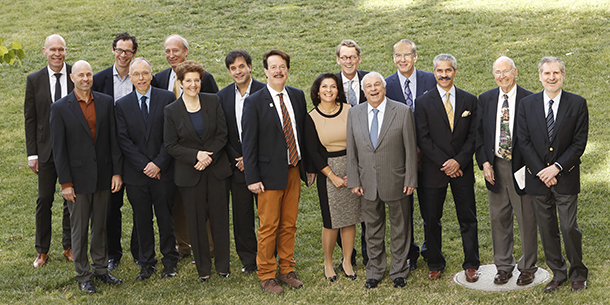Several of the world’s foremost neurology and neuroscience experts gathered recently to discuss the state of Alzheimer’s disease research at the third annual Zilkha Symposium on Alzheimer Disease and Related Disorders.
Titled “Bench to Bedside and Beyond: Relating Discovery Research to Translational Developments and Clinical Efforts,” the symposium was held April 15 at the Zilkha Neurogenetic Institute (ZNI) on the Health Sciences Campus. Berislav Zlokovic, MD, PhD, who is ZNI director and professor and chair of the Department of Physiology and Biophysics at the Keck School of Medicine of USC, hosted the event and participated in several sessions throughout the day.
“The incredible progress in Alzheimer’s disease research has not only increased our awareness of the disease but raised a hope that we will be able in a nearby future to arrest and reverse this devastating brain disorder,” said Zlokovic, the Mary Hayley and Selim Zilkha Chair in Alzheimer’s Disease Research. “Events like this are important to advance our work, so we are honored to have the support of Eva and Marc Stern, whose donation made it possible to have this year’s event.”
The symposium was broken up into four sessions, where physicians and researchers shared the latest unpublished results of bench discoveries and bedside progress. Topics included “Different Therapeutic Approaches to Targeting apoE,” by David Holtzman, MD, from the Washington University School of Medicine in St. Louis, which discussed the effects of three different approaches to targeting apoE, the strongest genetic risk factor for Alzheimer’s disease; and “Biomarkers of AD: Entering a New Era,” by Philip Scheltens, MD, PhD, from Vrije Universiteit Medical Center, Amsterdam, which gave an overview of the ability for physicians to provide a biological diagnosis of Alzheimer’s disease based on biomarkers, rather than the onset of symptoms such as dementia.
“At the Zilkha conference and in the Institute we support ‘science without borders’,” Zlokovic said. “‘It is not important who is going to make a breakthrough, but it is important to all of us that we find a cure for Alzheimer’s,’ as Mr. Zilkha said in his address to the conference speakers.”
Other speakers included Rudolph Tanzi, PhD, of Harvard University; Sangram Sisodia, PhD, of the University of Chicago; Robert Vassar, PhD, of the Northwestern University Feinberg School of Medicine; Christer Betsholtz, MD, PhD, of Uppsala Universitet, Sweden; Constantino Iadecola, MD, of Weill Cornell Medical College in New York; M. Elizabeth Ross, MD, PhD, of Weill Cornell Medical College; David Brody, MD, PhD, of Washington University School of Medicine; Jeffrey Cummings, MD, of Cleveland Clinic Lou Ruvo Center for Brain Health; and John Ringman, MD, of USC. Session chairs were Maria Carrillo, PhD, the chief science officer of medical and scientific relations at the Alzheimer’s Association, and Roderick Corriveau, PhD, program director of extramural research programs at the National Institute for Neurological Disorders & Stroke.
— Melissa Masatani


